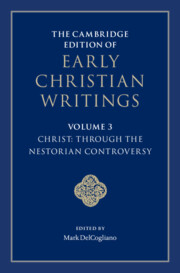Book contents
- The Cambridge Edition of Early Christian Writings
- The Cambridge Edition of Early Christian Writings
- The Cambridge Edition of Early Christian Writings
- Copyright page
- Contents
- Notes on Contributors
- Acknowledgments
- Note on the Texts and Translations
- Abbreviations
- Series Introduction
- Introduction
- Part I The Beginnings of Christology
- 1 Ascension of Isaiah 6–11 (Ethiopic Version)
- 2 The Gospel of Peter
- 3 The Epistle of the Apostles
- 4 The First Letter of Clement (Selections)
- 5 Ignatius of Antioch, Letters (Selections)
- 6 Epistle to Diognetus 1 and 7–12
- 7 Justin Martyr, First Apology 23, 30–32, 46, 63 and Second Apology 10, 13
- 8 Tatian, Address to the Greeks 4–7
- 9 Odes of Solomon 7, 19, 41, and 42
- 10 Treatise on Resurrection
- 11 A Ptolemaic Theology as Recounted by Irenaeus of Lyons in Against Heresies 1.8.5
- 12 Irenaeus of Lyons, Against Heresies (Selections)
- Part II Developing Christological Traditions
- Part III Traditions of Pro-Nicene Christology
- Part IV Controversy over Nestorius
- Suggestions for Further Reading
- Scriptural Index
9 - Odes of Solomon 7, 19, 41, and 42
from Part I - The Beginnings of Christology
Published online by Cambridge University Press: 05 February 2022
- The Cambridge Edition of Early Christian Writings
- The Cambridge Edition of Early Christian Writings
- The Cambridge Edition of Early Christian Writings
- Copyright page
- Contents
- Notes on Contributors
- Acknowledgments
- Note on the Texts and Translations
- Abbreviations
- Series Introduction
- Introduction
- Part I The Beginnings of Christology
- 1 Ascension of Isaiah 6–11 (Ethiopic Version)
- 2 The Gospel of Peter
- 3 The Epistle of the Apostles
- 4 The First Letter of Clement (Selections)
- 5 Ignatius of Antioch, Letters (Selections)
- 6 Epistle to Diognetus 1 and 7–12
- 7 Justin Martyr, First Apology 23, 30–32, 46, 63 and Second Apology 10, 13
- 8 Tatian, Address to the Greeks 4–7
- 9 Odes of Solomon 7, 19, 41, and 42
- 10 Treatise on Resurrection
- 11 A Ptolemaic Theology as Recounted by Irenaeus of Lyons in Against Heresies 1.8.5
- 12 Irenaeus of Lyons, Against Heresies (Selections)
- Part II Developing Christological Traditions
- Part III Traditions of Pro-Nicene Christology
- Part IV Controversy over Nestorius
- Suggestions for Further Reading
- Scriptural Index
Summary
The Odes of Solomon consist of forty-two short poems. Their provenance, date, and original language are all disputed. At least some of the Odes must have been written before the third century since Ode 11 is found in Greek in Papyrus Bodmer XI, which is datable to the third century, and since Lactantius (ca. 240–ca. 320) includes a quotation of Ode 19 in Latin translation in his Divinarum Institutionum (IV.xii.3). Parts of five odes (1.1–5, 5.1–11, 6.8–18, 22.1–12, and 25.1–12) are also found in Coptic translation in the Pistis Sophia, which is preserved in a single Coptic manuscript, probably from the fourth or fifth century, though scholars think the Pistis Sophia itself goes back to the third or fourth century. The Syriac tradition preserves the most complete witness to the Odes of Solomon, albeit in later manuscripts: Odes 17–42 are extant in a Syriac manuscript datable to the tenth century, and Odes 3–42 in a Syriac manuscript datable to the fifteenth to seventeenth century.
Information
- Type
- Chapter
- Information
- The Cambridge Edition of Early Christian Writings , pp. 84 - 91Publisher: Cambridge University PressPrint publication year: 2022
